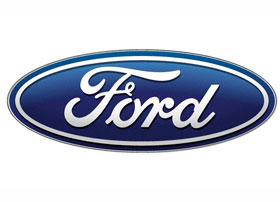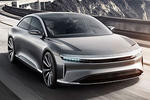
Ford is the market leader in Europe in bio-ethanol powered flexible fuel vehicles. Ford announces that it is prepared to offer its low-CO2 vehicle line-up at affordable prices in Europe. This line-up includes tech clean diesel and advanced direct injection gasoline engines, alternative fuel vehicles (including FFVs), CNG (Compressed Natural Gas) cars, LPG (Liquified Petroleum Gas) vehicles and hybrids.
Ford Press Release:
1. Flexifuel Vehicles: Part Of Ford's Broad Portfolio Of Environmentally Advanced Vehicle Technologies
Ford is a European market leader and pioneer in
bio-ethanol powered flexible fuel vehicles (FFVs). FFVs are part of Ford's portfolio of environmentally advanced, low-CO2 vehicle technologies which Ford is committed to offer at affordable prices to its customers. The portfolio includes further optimized conventional technologies (i.e. high tech clean diesel and advanced direct injection gasoline engines), alternative fuel vehicles (including FFVs and in some markets CNG [Compressed Natural Gas] and LPG [Liquified Petroleum Gas] vehicles), hybrid applications (including research into diesel stop/start and plug-in hybrid technology), and in the long term hydrogen powered internal combustion engines
and fuel cells. Some of those technologies are already available for today's customers (including FFVs); others are coming soon or are still in the phase of intensive research.
2. Flexifuel Models And Technology
Ford's current Flexifuel models: Focus and C-MAX Flexifuel.
Ford of Europe will extend its FFV range by offering Flexifuel versions of the new Mondeo, Galaxy and S-MAX from early 2008.
With this, Ford will offer one of the broadest FFV portfolios in Europe.
Run on E85 (85 per cent bio-ethanol; 15 per cent petrol), petrol only, or any mix of both in one fuel tank (making them flexible in terms of choice of fuel and operation)
Four key alterations made to the standard petrol engine to run on E85:
valve seats made of especially hardened material (durability)
bio-ethanol resistant fuel components
enlarged fuel pumps and injectors to cope with extra fuel flow
variable ignition control, automatically adapting to the ratio of bio-ethanol and petrol present in the fuel tank
3. FFV European Market Availability And Sales Data (FOCUS And C-MAX Flexifuel)
Focus and/or C-MAX Flexifuel available in 16 European markets now, incl. Sweden, Germany, the UK, the Netherlands, Ireland, Austria, France, Spain, Switzerland, Norway, Belgium, Italy, Poland, Hungary, Czech Republic, and Denmark. Other markets will follow.
Affordable: Prices for FFV versions in the same region of (or only marginally above) petrol technology.
Sweden: the first European market where Ford first introduced its FFVs in 2001; more than 80 per cent of Focus and Focus C-MAX sales and nearly 50 per cent of all Ford sales in Sweden are FFVs today.
Ford of Europe has sold 17.500 bio-ethanol powered Flexifuel vehicles across Europe in 2007. This marks an increase of 60 per cent compared to the previous year and a sales record.
More than 45,000 Ford Flexifuels sold in Europe since introduction in Sweden in 2001 (including approximately 31,000 units in Sweden).
In the past decade, Ford has sold more than 2 million FFVs worldwide. See also section 10, "Global commitment".
4. Pilot Projects Across Europe
Pilot projects (BEST; PROCURA) with Ford FFVs and external partners under way in Europe, to test potential large scale introduction of E85 fuel and FFVs.
BEST (Bio Ethanol for Sustainable Transport) focuses on bio-ethanol; pilot projects planned or underway in Sweden, the UK, Spain, Italy, Germany and the Netherlands.
PROCURA looks at bio-ethanol, bio-diesel and natural gas, and is establishing test programs in Italy, Portugal, Poland, Spain and the Netherlands.
Both projects, partly funded by the European Union, assist the market development of alternative fuels and vehicles. Through the establishment of large scale demonstration projects, the initiatives aim to provide a thorough understanding of the barriers and issues associated with the market penetration of alternative fuels and respective vehicle technologies in Europe. Project-members come from several areas, incl. the automotive and fuel industry, local and national government organizations, research institutions and fleet owners (public/private).
5. Governments' Role / Concerted Societal Action
There is no single solution to address the challenge of climate change: neither in society in general, nor in the transport sector in particular. Climate change can only be properly addressed by integrated approaches; through concerted efforts embracing a wide range of societal stakeholders. For the automotive sector, this includes the auto industry, the fuel industry/energy providers, government and consumers.
Within the automotive sector, bio-fuels such as E85 and FFV technology can make an important contribution to further reduce transport related CO2.
Governmental assistance including tax incentives is crucial to stimulate introduction and drive initial growth of a bio-ethanol fuel infrastructure and pick up of FFV technology. Tax incentives keep cost of ownership for bio-ethanol-using FFV drivers competitive. Reason: Due to lower energy content of bio-ethanol, fuel consumption of a FFV is higher when operated on E85. Tax incentives such as in Sweden (see section 6; for example: reduced company car tax, free parking in selected cities, etc) are helpful to catalyze the start up process.
Ford principally supports the move towards a CO2 based car taxation system, provided certain aspects are considered. One of those is the total life cycle ('well-to-wheel') CO2 emissions benefit of bio-fuel powered vehicles. The combined use of bio-ethanol as a fuel and flexible fuel vehicle technology can reduce total CO2 emissions by between 30 and 80% (depending on feedstock used and production process; source: EUCAR Concawe study; vs. conventional petrol technology). We believe that this CO2 reduction potential must be recognized by any CO2 based car taxation system. A good example is Sweden: Ford supports the Swedish government's approach of defining which vehicles to be considered as Environmentally Enhanced Vehicles (EEV's) that can benefit from fiscal incentives:
Environmentally Enhanced Vehicles (EEV) are defined as vehicles driven on
Renewable fuels = E85, methane (bi-fuel) or FAME (biodiesel), with a fuel consumption max corresponding to 9,2 l/100km; or
Fossil fuels = petrol or diesel, with a max CO2 emission of 120 g/km (diesel powered vehicles must be equipped with a diesel particulate filter).
6. The Swedish Example
The Swedish success story of E85 and Ford's FFV models is a prime example of what can be accomplished through co-operation and partnership between companies from different industries. Ford played a major and pioneering role, together with government and non-governmental organisations.
Incentives for environmentally friendly vehicles in Sweden embrace reduced company car tax, free parking in selected cities, reduced vehicle insurance, exemption from congestion charges in Stockholm and lower annual registration taxes. In addition, bio-ethanol is exempt from mineral oil tax. The latest incentive is a ca. 1,050,- € payback to the retail customers of environmental friendly cars like a FFV.
The Swedish Government has also mandated that 85 per cent of Government vehicle purchases (excl police, fire and ambulance vehicles) must be Alternative Fuel Vehicles; and that all petrol stations with an annual volume of more than 1000m3 must have an alternative fuel pump by Dec. 31, 2009, and all new filling stations must offer Alternative Fuels.
7. The French Example
Another example that demonstrates the need for - and potential of - integrated approaches is a bio-fuel charter that has been signed by a broad range of different stakeholders in France, including Ford. In the meantime the charter's recommended government incentives have been put into law.
The French government has agreed far-reaching tax incentives for both the fuel and FFV's (no mineral oil tax on ethanol, no company car tax for the first 2 years, reduced registration tax, no VAT on fuel for the fleet customer, etc), the installation of up to 500 E85 pumps by year end 2007 (186 have practically been installed with 50 waiting for approval) and 1,500 by year end 2008, and the commitment of the French administration to purchase 15 per cent FFVs within its overall 2007 vehicle purchases and 30 per cent in 2008 respectively.
8. Rising Number Of Fuelling Stations Across Europe
Due to the strong dynamics in the bio-fuel/FFV sector, more and more fuelling stations across Europe are starting to offer E85. In Sweden, the number has risen from almost none to more than 1000 filling sites since 2001 and it is projected that by 2009 nearly 60 per cent of Sweden's 4,000 filling stations will be retailing E85.
Outside of Sweden, there are at least 378 filling stations that offer E85. (Germany: 100; France: 186; UK: 15; Ireland: 16; Switzerland: 25; Netherlands: 3; Norway: 10; Hungary: 15; Spain: 8 – all data status Dec 2007)
E85 price examples (Jan 2008): Sweden: SEK 8,79 (vs SEK 11,99 for petrol RON 95); Germany: €0,95 (vs € 1,37 for petrol RON 95); France: € 0,84 (vs € 1,55 for petrol RON 95)
9. The Environmental Benefit
Main environmental benefit: As said, the combined use of bio-ethanol as a fuel and Ford's Flexifuel technology can reduce total life cycle ('well-to-wheel') CO2 emissions by between 30 and 80% (depending on feedstock used and production process; source: EUCAR Concawe study; vs. conventional petrol technology), and this without compromise to performance and driving quality. (CO2: carbon dioxide; main greenhouse gas responsible for global warming).
Bio-ethanol is a renewable fuel derived from plants (e.g sugar beet) or biomass (incl. waste wood). CO2 emitted by the vehicles is extracted from the atmosphere through new plant growth (photosynthesis). These plants are used to produce bio-ethanol. By this, the CO2 circle can be closed to a large degree.
Ford believes bio-fuels do represent an opportunity to make mobility more sustainable and we welcome pan-European Union and individual EU government initiatives to create a certification for sustainable production of bio-fuels.
Bio-ethanol will contribute to reducing the EU's dependency on oil and create new job opportunities in the agricultural and industry sector.
10. Ford's Global Commitment
Ford Motor Company is committed to FFVs throughout its global operations. Three new FFV models will be introduced to the North American market for 2009. In Thailand, Ford introduced a version of its successful Focus model running on regular petrol as well as on a specific bio-ethanol/petrol blend offered in that market. In Brazil, bio-ethanol technology is already long established and FFVs are now the dominant vehicle technology. In the past decade, Ford has delivered more than two million ethanol-powered vehicles worldwide.
In 2006, Ford Motor Company announced a £1 billion (approx. €1.5 billion) investment to develop a range of environmental technologies in Europe. Over 100 models and derivatives with improved emissions or fuel economy will be introduced over the next five years, including a regular Ford Focus consuming less than 4 l/100km and emitting less than 100 gCO2/km (tailpipe).











